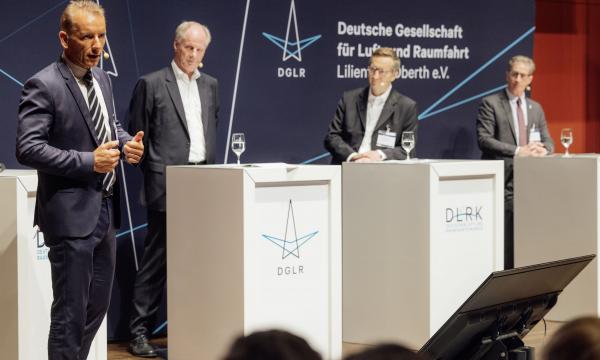
You are here
Chair of Air Transport Technology and Logistics
The 71st German Aerospace Congress (DLRK) took place in Dresden from 27 to 29 September. More than 700 scientists, young professionals and other interested parties exchanged information about current research approaches and projects.
The motto of this year's DLRK at the German Hygiene Museum Dresden was: "Aerospace - researching together and making it sustainable". This year's programme committee around its head, Prof. Dr.-Ing. Hartmut Fricke, Head of the Chair of Air Transport Technology and Logistics at the "Friedrich List" Faculty of Transport and Traffic Sciences at TU Dresden, had put together an impressive programme: 109 sessions, 450 different lectures and posters, a panel discussion and selected plenary and special lectures. In addition to a big celebration on the opening day, there were collective breaks for networking purposes and two big evening events.
During the opening ceremony on the first day of the congress, the President of the German Society for Aeronautics and Astronautics (DGLR), Roland Gerhards, emphasised the "strong urge for networking and exchange in presence after a long Corona break as well as the large German share in international aerospace". A second central topic at the celebration was the ongoing war in Ukraine and its effects on the aerospace industry. The 1st Vice-President of the DGLR, Dr. Cornelia Hillenherms, spoke of great challenges and a breach of trust with regard to cooperation in space following statements made by the Russian government.
German astronaut Dr Matthias Maurer also spoke about the situation with Russia in his plenary talk "Cosmic Kiss", especially with regard to the joint work on the International Space Station ISS. In his talk, Maurer also reported on his research during his mission on the space station, which can find current application in times of Corona: With his experiment "Touching Surfaces", the material scientist examined germ-killing material.
Current challenges of the aviation sector: How to improve the climate footprint of aircraft?
The current challenges of the aviation sector were also discussed at the DLRK. The main focus was on how to improve the climate footprint of aircraft - for example, through the use of innovative propulsion systems. For the head of the DLRK programme commission, Prof. Dr. Hartmut Fricke from TU Dresden, the future lies in Sustainable Aviation Fuels (SAF) and hydrogen technologies. According to Fricke, partial electrification is feasible for short- and medium-haul flights; for long-haul flights, other alternatives such as SAF would be needed. At the DLRK, electric aircraft and hydrogen engines and their characteristics were compared and discussed.
Panel discussion, 27.09.2022: "Green Operations" - Perspectives for sustainable development of transport and technology

In addition, the 71st German Aerospace Congress also served to acquire young talent and future work networking. As at previous congresses, student theses and dissertations from the field of aerospace were awarded prizes at this year's kick-off event.
The next German Aerospace Congress will take place from 19-21 September 2023 at the "Haus der Wirtschaft" in Stuttgart.
Source: News release of the German Aerospace Society from 30.09.2022
About the German Aerospace Congress
The German Aerospace Congress of the German Society for Aeronautics and Astronautics (DGLR) was first held in 1952. Since then, it has functioned as an annual aerospace network meeting with several hundred participants.
The congress is led and organised by a programme commission composed of several new members each year. The composition and number of members vary from year to year. Beforehand, there is a preparatory process lasting several months with important deadlines, such as lecture registrations or the beginning of participant registration.
This year's leitmotif of the DGLR, "Greener Operations", takes a look at the ubiquitous climate issues.
Prof. Dr.-Ing. Hartmut Fricke
Head of the Chair of Air Transport Technology and Logistics
"Friedrich List" Faculty of Transport and Traffic SAciences, TU Dresden
Mail: hartmut.fricke@tu-dresden.de
